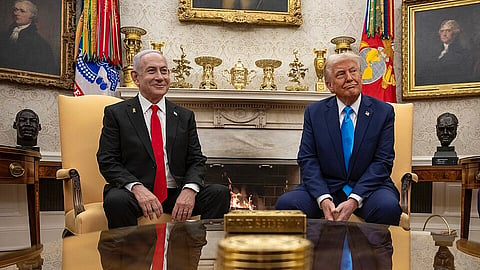

U.S. President Donald Trump announced Thursday that he would make a decision within two weeks on whether the United States will launch military strikes on Iran, signaling a potential rhetorical reversal amid rising tensions in the Middle East.
In a statement released by White House Press Secretary Karoline Leavitt, Trump said:
“Based on the fact that there’s a substantial chance of negotiations that may or may not take place with Iran in the near future, I will make my decision whether or not to go within the next two weeks.”
Trump’s comments follow a week of increasingly aggressive rhetoric directed at Tehran, including demands for Iran’s “unconditional surrender” and a veiled threat against Supreme Leader Ayatollah Ali Khamenei, the head of state.
The president’s remarks may be tied to a reported diplomatic meeting scheduled for Friday in Geneva, Switzerland, where Iranian Foreign Minister Abbas Araghchi is expected to meet with his counterparts from the United Kingdom, Germany, and France—collectively known as the “E3”—alongside the EU’s High Representative for Foreign Affairs, Kaja Kallas.
However, observers remain skeptical that Trump’s renewed openness to diplomacy is more than rhetorical. Just hours before Israel launched its surprise attacks on Iran last Thursday, Trump had posted on Truth Social that he had instructed his administration to pursue negotiations with Tehran. After the strikes commenced, he quickly shifted tone, boasting that he had known about the attacks in advance and even claimed that Iran’s chief negotiator had been killed—though this claim was unconfirmed.
Israel’s airstrikes came just two days before the sixth round of indirect talks between Washington and Tehran was set to take place in Oman on June 15. According to Axios and Reuters, U.S. envoy Steve Witkoff has recently initiated contact with Araghchi, however this was denied by Iranian news outlet Fars News.
Trump’s indecision comes amid mounting domestic pressure. Polls show that fewer than 20% of Americans support a war with Iran, and several prominent voices within his base—including Tucker Carlson and Steve Bannon—have publicly warned against U.S. military intervention. The conflicting messaging from the Trump administration over the past week reflects not only the chaotic nature of its foreign policy communication but also a deep internal divide on how to proceed.
While the possibility of a long and grinding war between Iran and Israel looms, the United States may find itself increasingly entangled. A large-scale logistical operation appears underway, with reports of an air bridge being established between the U.S. and Europe, likely aimed at delivering military assets to the region and arms to Israel.
Unless diplomacy yields results, Washington risks being pulled into a conflict that is both deeply unpopular at home and fraught with unpredictable geopolitical consequences.